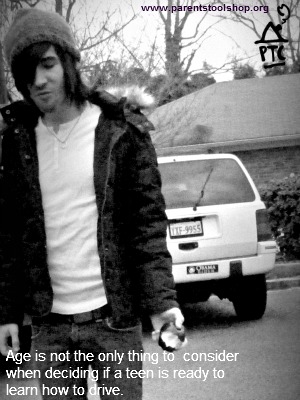Do you remember your first teenage driving lessons?
They often consist mostly of parents screaming:
“Watch Out!”
“Slow Down!”
“You’re scaring me!”
You probably felt discouraged and your parents probably felt scared and frustrated.
Would you like to make your child’s first teenage driving lessons more positive?
Teaching your child to become a responsible teen driver has its challenges. There are great safety risks when you give control of a vehicle over to a learning teen driver. You need to realize that learning how to drive is not a right, it is a privilege. If you decide your child is not yet ready to learn to drive, do not feel guilty. In fact, by teaching teenagers to drive only when they have matured, you may just save them from having a tragic accident and being part of those teenage driving statistics you hear about and see on the news. 
How do I know if my child is ready for teenage driving lessons?
Age is not the only factor you should consider when deciding whether your child is ready for teenage driving lessons. Ask yourself:
- Is my teen aware of his surroundings or easily distracted and unaware of other drivers’ behavior?
- Does my teen have good reflexes? Is she coordinated or could she lose control doing two things at once, like driving and adjusting the radio?
- Does my teen take driving seriously? Is he cocky and reckless or cautious and careful?
- Does my teen have a good reason to drive? Does she have a job or extra-curricular activities?
- How well does my child handle teenage peer pressure?
What Agreements Should I Get — Before Teaching My Teenager To Drive?
Driving is a wonderful opportunity for teens to learn about and practice having adult responsibilities and experiencing the outcomes of their choices. Before you even start teaching your teenager to drive, have a teen driving contract agreement that includes maintaining good grades, a job to pay for insurance, gas and repairs, and a good driving record.
A teen driving contract should also detail the consequences if teens break the agreement, such as if they get poor grades, have accidents that are their fault, get tickets, or are caught teen drinking, they will give up driving privileges. A teen driving contract is one agreement you should get in writing. Read “Will Having A Teen Driving Contract Agreement Reduce Teenage Driving Statistics Due To Teenage Peer Pressure,” for more ideas about what to include in a teen driving contract.
What To Say And Do When Giving Teenage Driving Lessons:
Avoid screaming “Watch Out!” or “Slow Down!” Screaming will only escalate teens’ nervousness, which will be a distraction that causes them to drive even worse.
Use a calm voice to give instructions of what you want your learning teen driver to do. Here are a few suggestions:
- “Next, you’ll want to . . .”
- “Be looking for . . .”
- “See if you notice . . .”
- “When you do _____, remember . . .”
Ask questions that help your teen driver think through the process of driving safely.
- “What is the speed limit here?”
- “How much space should be between you and the car ahead?”
- “What is the next turn you are looking for?”
Try to relax, breath deep, watch tone of voice and body language (avoid gripping the dash).
Follow these guidelines and teaching your teenager to drive will go more smoothly and will be a positive activity for both you and your learning teen driver.
For more insights, information and practical tools and tips about helping children develop independence and responsibility in all areas of their life; get the complimentary 7 Keys to Parenting Success ebook.
*******************************
Jody Johnston Pawel, LSW, CFLE is President of Parent’s Toolshop® Consulting, where she oversees an international network of Toolshop® trainers. For 30+ years, Jody has trained tens thousands of parents and family professionals worldwide through her dynamic workshops and hundreds of interviews with the media worldwide, including Parents and Working Mother magazines. She is the author of the award-winning book The Parent’s Toolshop®, and countless multimedia resources that support and educate parents from diverse backgrounds, plus other adults who live or work with children. You can find them at her award-winning website, www.ParentsToolshop.com.
Reprint Guidelines: You may publish/reprint any article from our site for non-commercial purposes in your ezine, website, blog, forum, RSS feed or print publication, as long as it is the entire un-edited article and title and includes the article’s source credit, including the author’s bio and active links as they appear with the article. We also appreciate a quick note/e-mail telling us where you are reprinting the article. To request permission from the author to publish this article in print or for commercial purposes, please complete and send us a Permission to Reprint Form.
